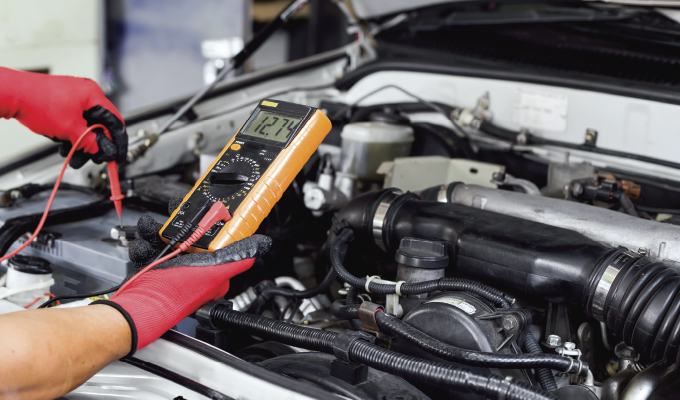Work truck electrical systems have grown more complex in recent years, providing not just ignition and lighting but a growing array of accessories inside and outside the cab. Along with this complexity comes greater risk of electrical problems as wiring and components age and undergo wear and tear.
Here’s a look at some of the common electrical points of failure in work trucks and key electrical parts you should have on hand to keep your fleet up and running.
1. BATTERY
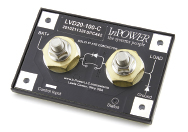
Without a working battery, your work truck is in trouble. Make sure wires and lugs are properly connected to the vehicle’s battery terminals and that the points of contact are kept clean. Otherwise, corrosion could build up, causing a reduction in battery performance. You’ll need plenty of high-quality electrical tape to wrap any exposed wiring. Other useful supplies include battery lugs and boots to make sure your battery connections are tight and free of moisture and dirt.
Many work truck vehicles come equipped with low-voltage battery disconnects to prevent battery drain when vehicles are not in use. If your vehicles don’t have a low-voltage battery disconnect, you might consider installing one.
2. WIRING
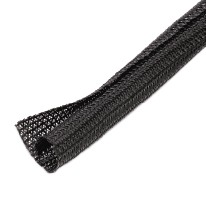
Wire corrosion and breakage can sideline a work truck’s electrical system. Keeping a good supply of wire coverings on hand such as heat shrink and braided sleeving will help prevent nicks and damage to your fleet’s electrical wire and cabling. A supply of inexpensive heat shrink butt connectors will help ensure the wires can be reconnected quickly if a wire breaks. If wire needs to be replaced, be sure it is constructed from high-quality copper with durable jacketing to resist wear and corrosion.
3. CONNECTORS
Even the heavy-duty electrical connectors found in work trucks and trailers can come unsealed when subjected to the constant motion and vibration of everyday use. Check your connectors routinely, and keep a few connector sealing plugs and boots on hand. Any cavity that is not being used in a multi-pin connector should be plugged to keep it free of debris. Dielectric grease and corrosion-preventive sealants can also come in handy for protecting connection points.
4. LIGHTS
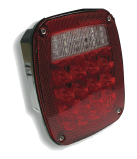
Make sure you have a backup supply of turn signal and brake lights, marker lamps, spotlights, floodlights, cargo lights, and any other specialty lighting connected with your trucks. Some lights are built to handle multiple functions within a single housing such as the Stop-Tail-Turn/Backup/License light (shown at left) available at Waytek. Look for lights that are made with shatterproof polycarbonate lenses instead of glass.
Older work trucks may come equipped with electromechanical flashers, which are prone to failure in the field and should be replaced with electronic flashers when they fail.
5. CHARGERS & OTHER ACCESSORIES
Work trucks are host to a variety of electrical accessories that periodically should be replaced or upgraded. Make sure you have adequate supply of alarms, horns, buzzers, sockets, plugs, and USB chargers. The newest USB chargers come with LED illumination to let you know they’re functioning.
6. FUSES, RELAYS, & CIRCUIT BREAKERS
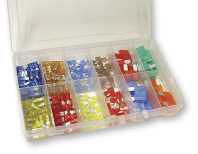
Circuit protection devices play a critical role in protecting your electrical equipment. Any time a fuse blows, it must be replaced. And while relays and circuit breakers are more durable, they have the potential to fail the longer they are in use. It makes sense to keep a spare or two in the vehicle and more in the repair shop.
Most work trucks come with several fuse blocks built into various locations in the electrical system. Newer cartridge-style fuses such as Eaton’s FMM fuses and FMS fuses take less space than traditional fuses. Battery mount fuse holders—such as Littelfuse ZCASE fuse holders—are also becoming popular because they can be placed directly on a battery for easier access and maintenance.
Fuse circuit taps are another practical item to keep on hand, especially if you are adding new lighting, communications equipment, or other electrical accessories. A fuse circuit tap can be added to ease the increased burden on existing fuses.
Mini relays that control pumps and heating and cooling fans are especially prone to failure in work trucks. Identify any mini relays used in your vehicles and keep extras on hand.
7. KEEP QUALITY TOP OF MIND
Make sure the electrical parts you stock are made by reliable manufacturers with high quality standards. Skimping on quality—whether using cheap wire that breaks too easily or components that wear out too fast—may save a bit of money in the short term, but you’ll have a higher price to pay in terms of future downtime and repairs.
8. DON’T ASSUME AVAILABILITY
The availability of electrical components has fluctuated from the supply bottlenecks of the pandemic to recent surpluses in some categories. No one can say for sure what the future holds. Although some components are easier to come by than they were a year ago, others have lead times of four months or longer. If in doubt about the best time to order parts, talk to your supplier. They should be able to tell you how much of a given part is in stock and the required lead time for parts in short supply.
OUNCE OF PREVENTION
Electrical system maintenance is critical to keeping your fleet running safely and reliably. Part of that process includes maintaining your supply of electrical replacement parts. In the long run it will pay off, helping you keep your vehicles on the road longer and reducing the downtime needed for repairs.
ABOUT THE AUTHOR
Rob Iversrud is the product and category manager at Waytek, Inc. Find out more, visit www.waytekwire.com.


